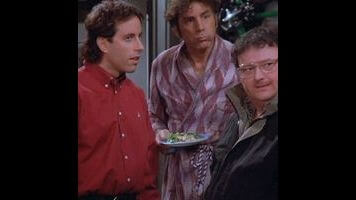Seinfeld: "The Pitch"/"The Ticket"

After last week's enjoyable silliness, Seinfeld kicks off its first ever real, ongoing plotline in the double episode of "The Pitch" and "The Ticket." We've seen little mini-arcs (like the quest for Kramer's jacket) on the show before, but this is the first time we're digging into a plot that's going to cover a whole season. Fitting to Seinfeld, that plot is a referential re-telling of the creation of Seinfeld, told through the eyes of Larry David, who casts himself (George) as an agent of destruction and supreme schmuckitude; at one point, obsessed with his salary, status, and fame, and at the next, an unshaved, disheveled artiste insisting that the NBC execs follow his vision of "a show about nothing" to the letter.
The genesis of Jerry, Seinfeld's bizarro version of Seinfeld, is of course not an accurate re-telling of that show's creation, which I'm sure was less amusing and involved less vomit. But you have to think that these episodes, scripted by Larry David, are some sort of commentary on what he feels is the strange nature of TV development and of his role in the whole thing. If you watch the DVD extras, especially of the early seasons, you know that he could barely handle the idea of writing a four-episode first season and was horrified at the second-season pickup for 13 episodes. Now that he's been in TV for 20 years solid, I'm sure he's used to the whole thing, but the fact that he once again did some meta-mocking of TV development in Curb Your Enthusiasm shows he hasn't lost his fascination with the idea.
Jerry comes about in an almost hilariously simple fashion. Two NBC execs walk up to Jerry after a comedy act, tell him he's funny, and say they want to be in the Seinfeld business. George, who happens to be standing next to Jerry at the time, convinces him that a "show about nothing," about the lives they lead and the minutiae therein is the way to go. Other people (including George) suggest more sitcom-y ideas like Jerry as a gymnastics teacher, or running an antique store, or Jerry as the manager of a circus. "People, they want to watch freaks!" says Kramer. But George's idea of lifelike comedy (he mentions "The Chinese Restaurant" as an idea for an episode) is obviously appealing to Jerry because that's what his act revolves around, like their little bit about the pronunciation of "salsa." "Everyone is doing something, we'll do nothing," George insists. There's a lot of winking to the audience in case they didn't realize the whole thing was a meta-commentary (I guess NBC feared that they might not), but such are the pitfalls of having a laugh track.
The execs hearing Jerry and George's pitch are the two guys from the bar, Susan Ross (who will, of course, become the most-featured recurring character in the show, outside of Newman), and Russell Dalrymple, played by Bob Balaban, who is extremely fearsome in his steely silence. This is where David's extended commentary on himself is at its most heightened. George is sweaty and terrified before going in ("They're men with JOBS, Jerry, they wear suits and ties!"). But once he lays down the idea of "nothing" to Dalrymple and his cronies, he refuses to bend to Jerry's attempts to temper the idea. "Maybe in philosophy, but even in nothing there's something," Jerry pleads, but George won't budge, saying maybe an episode will be about him reading a book. "Why am I watching this?" asks Dalrymple. "Because it's on TV!" George says. "Not yet."
The creation of Jerry can be seen as David's education on how he had to strike a balance between his prickly nature and the art of glad-handing, something Seinfeld undoubtedly helped him with, although this always going to be an imperfect metaphor, because while Larry David is a genius, George is mostly treated like a moron and while Seinfeld became a huge success, Jerry does not.
Jerry immediately eviscerates George for his failure with NBC, saying that he needs to go to Vienna for therapy, "Not the once a week for $80, no, you need a team." George, never one to take a monstrous screw-up lying down, decides he'll call Susan, because they had good eye contact, and he only meets three women a year. A quick aside of Kramer-vomit onto Susan seems to put the whole thing in jeopardy, but somehow, she still argues for them with NBC, and they get a second meeting. There, George is just as obnoxious as before, but the other way around, insisting, "You must have a good story, otherwise it's just masturbation." That masterstroke somehow seals the deal.
George's fluctuations continue. He's terrified that he has to write the thing once they get the deal, but is then insulted by their offer of $13,000, for both of them, to write the pilot. He's a man possessed of no self-confidence who, at the same time, has utter contempt for everyone else. Jerry, of course, is what keeps George from exploding off the face of the planet. Their relationship is perfectly exemplified by this hilarious exchange, which George has no answer to:
George: I can't live knowing Ted Danson makes that much more than me! Who's he?
Jerry: He's somebody.




![HBO teases new Euphoria, Larry David, and much more in 2026 sizzle reel [Updated]](https://img.pastemagazine.com/wp-content/avuploads/2025/12/12100344/MixCollage-12-Dec-2025-09-56-AM-9137.jpg)



































